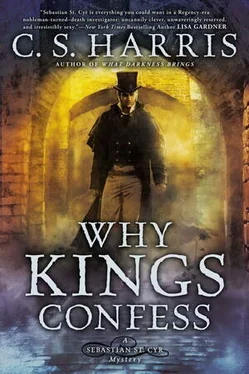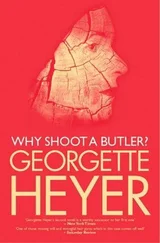C. Harris - Why Kings Confess
Здесь есть возможность читать онлайн «C. Harris - Why Kings Confess» весь текст электронной книги совершенно бесплатно (целиком полную версию без сокращений). В некоторых случаях можно слушать аудио, скачать через торрент в формате fb2 и присутствует краткое содержание. Год выпуска: 2014, Издательство: Penguin Group US, Жанр: Исторический детектив, на английском языке. Описание произведения, (предисловие) а так же отзывы посетителей доступны на портале библиотеки ЛибКат.
- Название:Why Kings Confess
- Автор:
- Издательство:Penguin Group US
- Жанр:
- Год:2014
- ISBN:нет данных
- Рейтинг книги:5 / 5. Голосов: 1
-
Избранное:Добавить в избранное
- Отзывы:
-
Ваша оценка:
- 100
- 1
- 2
- 3
- 4
- 5
Why Kings Confess: краткое содержание, описание и аннотация
Предлагаем к чтению аннотацию, описание, краткое содержание или предисловие (зависит от того, что написал сам автор книги «Why Kings Confess»). Если вы не нашли необходимую информацию о книге — напишите в комментариях, мы постараемся отыскать её.
Why Kings Confess — читать онлайн бесплатно полную книгу (весь текст) целиком
Ниже представлен текст книги, разбитый по страницам. Система сохранения места последней прочитанной страницы, позволяет с удобством читать онлайн бесплатно книгу «Why Kings Confess», без необходимости каждый раз заново искать на чём Вы остановились. Поставьте закладку, и сможете в любой момент перейти на страницу, на которой закончили чтение.
Интервал:
Закладка:
Sebastian glanced toward Marie-Therese, who sat rigidly staring at him with palpable dislike. He said, “Pelletan took a risk, preserving the heart of the child who died in the Temple. He obviously believed the boy was indeed the Dauphin.”
“The rumors that the Dauphin somehow escaped the Temple-that the boy who died in his place was an unfortunate deaf-mute imposter-are just that: rumors. A myth. A tale told to comfort those unable to accept the harshness of reality.”
“Yet the rumors persist.”
“They do, yes. I will never understand why the revolutionaries failed to show Marie-Therese her brother’s body. Perhaps after years of neglect and mistreatment, they feared she might not recognize him. Or perhaps they feared allowing her to see the state to which their cruelty had reduced him. But there is no doubt in my mind that the last son of Louis XVI and Marie Antoinette died in the Temple in 1795. To suggest otherwise is as ridiculous as to lend credence to the silly tales of the Dark Countess.”
Sebastian shook his head, not understanding. “What Dark Countess?”
Lady Giselle gave a small, tight laugh that held no real humor. “Ask Ambrose LaChapelle. I’ve no doubt he would enjoy telling you the story.” She took the second plate from Sebastian’s hand. “And now you must excuse me, my lord. Thank you for your assistance.”
He watched her return to the Princess’s side and fuss about her with unfailing good humor. A few glances were thrown in his direction, but he had no doubt Lady Giselle was seriously editing her recital of their conversation.
He went in search of Ambrose LaChapelle. But neither the French courtier nor the Comte de Provence was in attendance that night. Sebastian was just calling for his hat and cloak when a small, lithe figure in a tiger’s striped waistcoat wiggled in through the crush, deftly evading all attempts to collar him.
“Guv’nor!” cried Tom, panting as he skidded to a halt. “Come quick!”
Sebastian felt his stomach twist as he gripped the boy’s slim shoulders. “What is it? Is it Lady Devlin?”
“What? Oh, Lord no. It’s Sir ’Enry Lovejoy. ’E says t’ tell ye that Frenchy colonel ’as been found dead, on the Old Swan Stairs. And wait till ye ’ear what the killer done t’ ’im!”
Chapter 38
W hat was left of Colonel Andre Foucher lay sprawled on his back halfway up-or halfway down, depending on one’s perspective-the ancient, slime-covered granite steps known as the Old Swan Stairs. Located at the base of Swan Lane just above London Bridge, the stairs led from the lane down to the Thames.
By day, it was a busy landing point for the wherrymen and barges that plied the river. But at this hour of the night, the river was deserted. A heavy, wet fog swirled around the body; the air was thick with the smell of the river and damp stone and death. His arms were thrown up on either side of his head, elbows slightly bent, palms toward the white sky. Sebastian took only one look at the man’s face before turning away.
“Good God. What did they do to him?”
Sir Henry Lovejoy stood at the edge of the steps with his hands thrust deep into the pockets of his greatcoat. He had a scarf wrapped around his neck and held his shoulders hunched forward, although whether it was from the cold or the horror of what lay before him, Sebastian couldn’t have said.
The magistrate cleared his throat. “It appears someone has gouged out his eyes.”
“And his heart?”
“Oh, he still has that.”
Sebastian squinted down the river, toward the bridge. But the fog was so thick he couldn’t see five feet in front of his face. “How did you even find him?”
“A wherryman tripped over him.”
“Has anyone spoken to Harmond Vaundreuil?”
“Not exactly. The clerk, Camille Bondurant, identified the body. According to the constable who carried the news to the Gifford Arms, Monsieur Vaundreuil took the news quite badly. He’s now dosed himself with laudanum and taken to his bed.” Lovejoy’s disgust at this Gallic display of sensitivity flattened his face and quivered his nose, although he felt compelled to add, “I gather he has a bad heart.”
“He thinks he does, at any rate.”
“Having two of your party of five murdered-brutally-is enough to give anyone a bad heart.”
“True.”
Sebastian hunkered down beside the murdered man and forced himself to take another look. A dark stain of blood spread out from beneath the body. “How was he killed?”
“Stabbed in the back, from the looks of things. But we’ll know more when Gibson’s had a go at him.”
“I wonder why the eyes?” Sebastian said, half to himself.
“It is rather symbolic, is it not? Rather like the theft of Pelletan’s heart. Perhaps Foucher saw something he was not supposed to see.”
Sebastian let out a long, troubled breath. In his arrogance, he’d thought he was narrowing in on who had killed Damion Pelletan, and why. But Foucher’s death-and, more important, what had been done to him after death-suggested that the focus of Sebastian’s inquiries so far had been all wrong.
• • •
He pushed to his feet. “Have you heard anything about this morning’s explosion in Golden Square?”
Lovejoy nodded. “I saw a preliminary report not long ago. It seems the rooms in which the charge was set were empty; the woman who previously occupied them died last week.”
“Convenient. No one saw anything?”
“Apparently not. But there’s no doubt that whoever set the blast knew what he was doing. I’m told the gunpowder was contained in such a way that the full force of the blast went upward.”
“Toward Alexandrie Sauvage’s rooms.”
“Yes.”
Sebastian brought his gaze back to the French colonel’s ruined face. He’d become convinced that the theft of Damion Pelletan’s heart was somehow connected to the reason for his murder. But Foucher’s death complicated that scenario even as it underscored his conviction that they were dealing with a killer who was either far from sane or else diabolically clever.
Or perhaps both.
The problem was, how did that morning’s attempt on the life of Alexi Sauvage fit into any of it?
“Nothing symbolic about trying to blow someone up,” he said aloud.
Lovejoy swallowed. “If there is, I don’t see it.”
Sebastian nodded and started up the stairs, the soles of his dress shoes slipping on the wet, slimy stones. Then he paused to look back as a thought occurred to him. “What was Foucher doing here, anyway?”
“That we don’t know.”
“Monsieur Vaundreuil picked a damned inconvenient time to dose himself with laudanum.”
“Perhaps he’ll have developed more of a stiff upper lip by tomorrow.”
“One can only hope,” said Sebastian.
Wednesday, 27 January
The next morning, Charles, Lord Jarvis, was still in his dressing room when he heard someone ringing an impertinent peal at the distant front door. He pulled on an exquisite pair of unmentionables and calmly buttoned the flap.
His valet’s head jerked around, eyes widening at the sound of a shout, followed by a light, quick step on the stairs.
Jarvis said, “From the sounds of things, I shall shortly be receiving a visitor. You may leave us.”
“Yes, my lord.” The valet bowed and moved toward the door, just as the handle turned and Viscount Devlin walked into the room.
“Oh, good,” said Devlin. “You’re still here.” He was dressed in doeskin breeches, tall Hessians, and a black coat, and he brought with him all the smells of a foggy London.
Jarvis wrinkled his nose and reached for a starched white cravat. “As you see.”
Devlin shut the door in the interested valet’s face. “I take it you’ve heard about Colonel Foucher?”
Читать дальшеИнтервал:
Закладка:
Похожие книги на «Why Kings Confess»
Представляем Вашему вниманию похожие книги на «Why Kings Confess» списком для выбора. Мы отобрали схожую по названию и смыслу литературу в надежде предоставить читателям больше вариантов отыскать новые, интересные, ещё непрочитанные произведения.
Обсуждение, отзывы о книге «Why Kings Confess» и просто собственные мнения читателей. Оставьте ваши комментарии, напишите, что Вы думаете о произведении, его смысле или главных героях. Укажите что конкретно понравилось, а что нет, и почему Вы так считаете.












